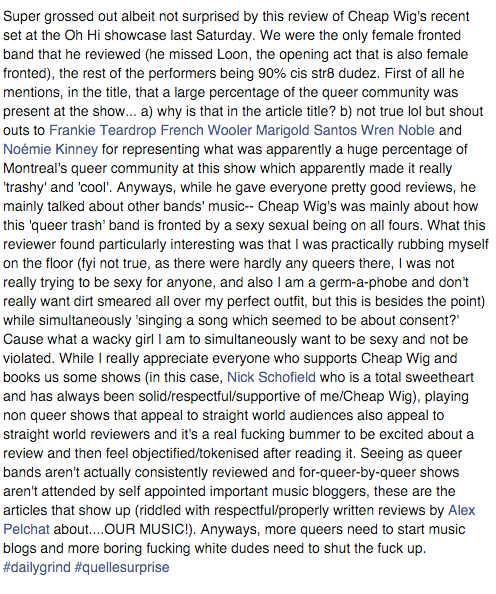“Who decides which narratives are correct?
In my view, narratives of identity function like tools or instruments for the purpose of enabling individuals to develop strategies for coping with the various factors of nonbeing that threaten to either impoverish the quality of human existence or to corrode habitual ways of thinking and acting that have proven to offer existential comfort.” –Clevis Headley
What constitutes an authoritative source of knowledge?
This is a topic that comes up quite a bit when discussing Wikipedia and the main motivation behind feminist edit-a-thons. There is a general issue of “trust” when it comes to relying on Wikipedia because “anyone can edit it!”. At this point however the editing system has become quite complex and while it is advisable to double check information listed before basing a paper on it, external reports have concluded Wikipedia is almost on par with Encyclopedia Britannica in reliability. The problem Art+Feminism is trying to address, is based on the very narrow demographics represented by the average wiki editor. That is Who edits Wikipedia and how their A/S/L affects what topics are covered and the perspective they are written from. As the majority of editors are white, western men, the content of articles skews (dramatically) toward content that reflects that particular demographic. Women of any field are notoriously under-represented on Wikipedia, and if they are present, their articles often begin by making reference to their sexuality (she was a lesbian!) or any closely linked male who was also well known (husband, son, father, colleague). Women are also largely categorized differently than their male counterparts (aka: “sub categorized”, with a focus on them being women first, and writers/painters/inventors/etc second.)

This is of course not much different than the perspective we get in newspapers, radio, history books, etc. For centuries, institutions of knowledge dissemination (universities, publishing houses, major media) have been headed by the same demographic as is now seen on Wikipedia, offering a white-supremacist, patriarchal, hetero and usually capitalist view of the world which is dominant in the west and was spread through colonialism. And while these demographics are changing, undoing the structure of beliefs currently in place is slow going, as demonstrated by the majority of high school text books still hailing Christopher Colombus as a hero.
“Any medium has the power of imposing its own assumption on the unwary” McLuhan, The Medium is the Message
Here is what gets interesting with Wikipedia, it can be updated instantly, and there is a much lower barrier to entry for hopeful editors. Now that the interface has a visual option like WordPress, you don’t even need to know code. So while Wikipedia may have a pretty bad gender bias right now (and cultural/socio economic/ableist) there is room for so many more voices.

Much in the same way that platforms like Twitter and Tumblr have given a voice to marginalized communities that can be heard worldwide, Wikipedia has the potential to be a great equalizer in terms of exposing people to information they would never have otherwise had access to.
“Oppressed people resist by identifying themselves as subjects, by defining their reality, shaping their new identity, naming their history, telling their story.” – Jewel Amoah
There are as many sides to a story as there are people involved, and to let one group decide how all others are perceived leaves those in power unchallenged and the rest unheard. There is so much lost and so much hidden in our world history. Historians are too often treated like scientists despite the amount of intuiting involved, and how much of their craft resembles story telling. Every person has a bias that, while it can be reduced, cannot be erased. At least with a more diverse selection of editors on Wikipedia, we can look forward to some variety in the stories they tell.




